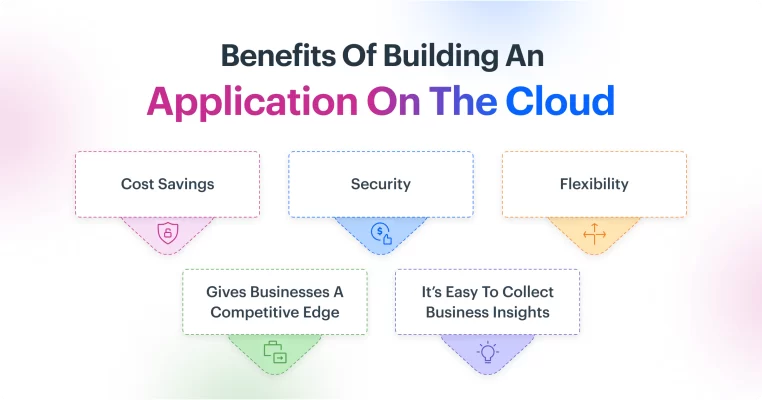Development of a cloud application is the process wherein an app is created in a cloud environment rather than housed on a local server or machine. A cloud app differs from a native one in degree of usage of cloud services. Though data storage is online, the program might execute in a web browser.
Organizations are depending increasingly on the processing capability of the cloud and developing original and inventive answers to many challenges. They do once unthinkable tasks using technology. Cloud services have enabled businesses to create numerous web-based cloud applications—web apps.
Today, many people use cloud apps that have replaced chores including email, word processing, file storage, data collecting, and financial accounting.
Using Cloud-Based Apps Has Advantages
Making applications from the cloud will provide you some of the most significant advantages and benefits.

Money Savings
Since you avoid investing in on-site infrastructure and servers, cloud application development is typically less expensive. For small firms, cloud-based software is forty percent more reasonably priced. Building and storing programs on the cloud lets you pay only for the services you use, therefore controlling expenses. You can decide on your monthly payment amount and lower the app development expenses.
Using a standard hardware server, you have to pay for capital and on-site hardware. Especially if your company grows quickly, you can wind up squandering a lot of money. With cloud servers, on the other hand, you add servers as needed and pay just for what you require. Certain cloud computing companies also offer discounts for big businesses or long-term contracts.
Protection
Store your data on the cloud if you wish a safe access to it. For years, data security has tormented businesses; protecting private information is getting more and more challenging. Security precautions offered by cloud services assist to maintain your data safe.
While some services incorporate built-in encryption, others encrypt files. Hackers and other illegal users find encrypted data less easily accessible. Your data remains safe even if someone gets illegal access to your computer or account. More efficient than a traditional in-house system, a cloud host closely watches security. After moving to the cloud, 94 percent of companies claimed better security, according to Rapid Scale, a provider of cloud services.
Gives Companies a Competitive Advantage
In the corporate climate of today, a company with cloud-based apps is more competitive since it possesses the means to thrive. The IT team spends less time overseeing infrastructure and more time developing solutions that support company expansion as the cloud service provider oversees everything.
A corporation using cloud-based technologies leads the others. By the time they catch up, it also reflects further along the learning curve. Research indicates that 77 percent of companies claim cloud computing increases their competitiveness. Furthermore, cloud service providers are always enhancing their offerings, thus a business can access current technology without having to spend on new gear or software.
Versatility
Your IT staff will not be able to concentrate on developing business solutions if they spend much of their time concentrating on computer and data-storage problems. If another company handles infrastructure and IT hosting, though, your staff may concentrate on business solutions directly impacting the company’s bottom line.
Unlike local servers, cloud services provide more adaptability and allow you to boost bandwidth only as needed. This adaptability will help your company to be far more efficient overall. A cloud architecture helps a company to rapidly satisfy consumer needs.
One Can Easily Gather Commercial Insights
Data now ranks as the most valuable resource available worldwide, not oil. Actionable, useful information just waiting to be used is hidden within consumer interactions and company systems. But unless you have a decent cloud-computing solution, sorting data can be challenging. Many cloud storage options provide cloud analytics, therefore providing a bird’s eye perspective of your data.
You can create bespoke reports and rapidly examine information organization-wide. Apply your gained insights to improve performance and create action plans to satisfy company objectives. Using cloud-based business analytics, a beverage company called Sunny Delight raised profits by almost $2 million annually.
Characteristics Every Cloud App Development Should Include :
Simplicity
Cloud platforms should enable simpler and faster development of cloud apps. They should enable customers to quickly address cloud application development problems and streamline the architectural decision-making process. Good cloud application development tools help to simplify software deployment throughout several IT environments.
Two Aspects Are Scalability and Adaptability
Should you want to scale or change your cloud services, the cloud platform should make such changes simple. As needed, users should be able to add or subtract processing, storage, networking, and other assets. Dynamic scaling for users is handled via automation tools found on cloud platforms. Users can avoid bottlenecks and maximize workloads housed on clouds.
Development of cloud-based applications also depends much on flexibility. Appropriately set cloud platforms automatically expand resources to match increasing app demand. And services resume normal when demand declines.
Security
More adept at managing risks than most in-house IT teams, cloud application development platforms have some of the greatest security specialists available worldwide. Actually, most multinational financial companies agree the cloud provides security benefits.
Common security standards apply on the development platforms, hence hackers cannot access your data. Your company will be able to satisfy federal rules as well. Of the firms that have moved to the cloud, 91% have stated better compliance following migration.
Automation
Managing applications involves a lot of repetitious chores. Tools for the creation of cloud applications are meant to be programmatically controlled. By supporting continuous integration, resource orchestration, and capacity management—which lowers operating costs and lets IT accommodate ever-rising computing needs—they create value.
Pay-Per-Use Cost
Most systems for developing cloud applications provide pay-per-use rates. Large-scale IT cost savings made by this methodology also help to increase efficiency. The user pays just for the space they use or the service they employ. There are no hidden costs, and usually, some space is set aside for free. Using charge-per-use features helps one maximize resource use. The cloud service provider tracks and reports on the use of cloud resources.
Questions to Consider Before Deciding on a Platform for Developing a Cloud Application
-
What Cloud Computing Services Do You Offer ? The cloud services provider won’t be a good fit if they lack the required offerings.
-
To What Extent Safe is Our Data ? Inquire of the vendor about their methods of security. Particularly with regard to protecting consumer data, security is absolutely crucial.
-
Are Your Backups Consistent ? A fundamental cloud computing capability is backup. Should your data vanish, corrupt, or be compromised, you should be able to restore it from a recent backup.
-
Your Service Outages Are How Often ? Small firms forfeit $7900 every minute during downtime. All service providers experience outages; thus, concentrate on the quantity and duration of the outages.
-
Are My Services Easily Under Control ? Your decision of provider will depend on how simple you find managing your cloud services.
-
Am I Able to Scale Offerings ? As needed, you should be able to increase capacity and services; you should be able to eliminate those you no longer need.
-
Which Offerings Are Made Available ? Find more about the service-level agreements covering backups, restorations, uptime, and more.
-
Does a Free Trial Exist ? Testing the cloud service before making a purchase is possible with a free trial.


